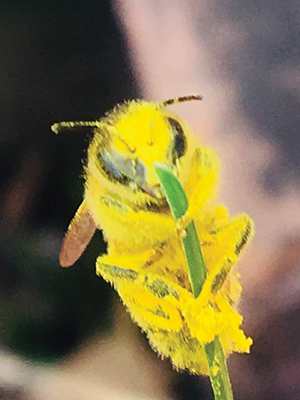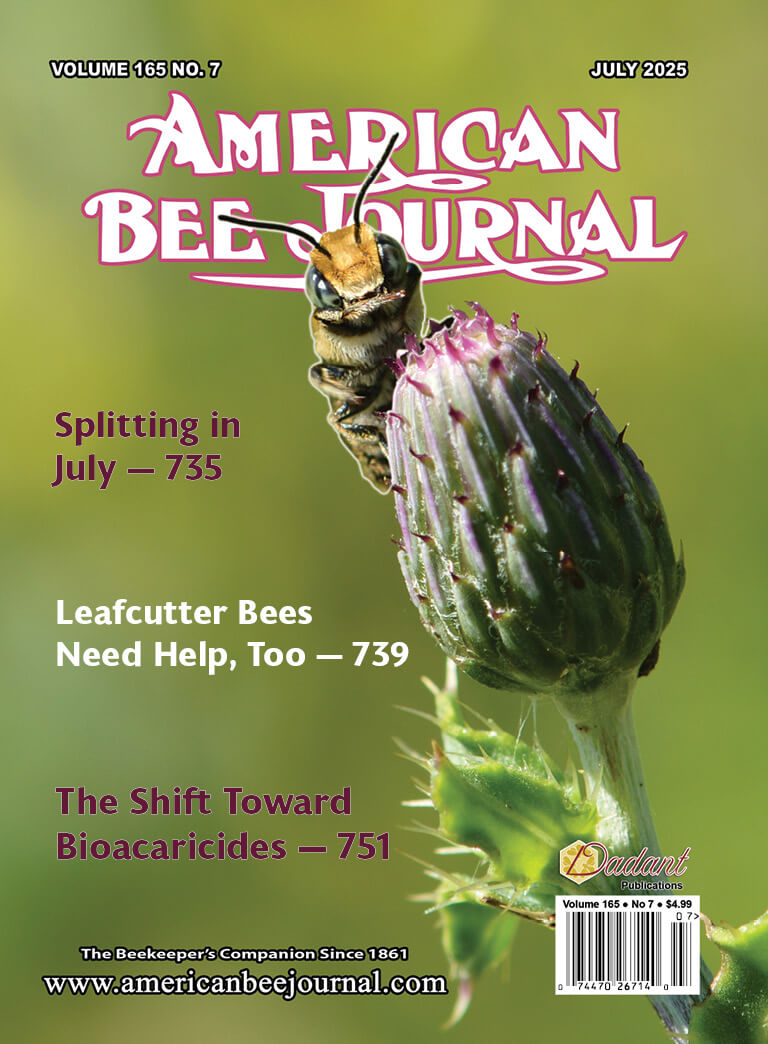
Overachiever
I keep a hive in my backyard as a hobby. I discovered this little lady last spring about 3 feet from the hive … she was so loaded down she couldn’t make it back in! I let her rest then gave her a lift back into the box. Overachiever!
Michelle Mettert
Fort Wayne, Indiana
Back copies
Hi Eugene,
My name is Stan Taylor and I live in Western Australia and have been receiving the American Bee Journal since early 1976 when Vern Sisson, a former editor, talked me into supplying crop reports for our state.
Recently, I decided that I had reached an age when I should be disposing of some of my “assets” out in the shed, and “important” paperwork going back over 60 years.
Unfortunately, I decided to make a start by gathering all my copies of the ABJ into one, large, pile and sort them annually. Big mistake. I am now reading through the whole lot and finding so much valuable information that I can pass on to the huge number of beginners … And my clean up programme has come to a grinding halt.
I was so busy back in the 60s through the 2010s with running a one man commercial outfit involving 5 or 6 shifts a year; selling bee gear as state agent for Guilfoyle’s equipment; refining and exporting beeswax etc. that I didn’t always have time to read magazines. So, now I am catching up.
The reason that I am telling you this is because I have just realised that, back in those days, whoever was responsible for compiling the magazine each month was guilty of what I would consider to be one of the worst criminal acts in publishing. Many times I would get to the end of a page to be told to “turn to page 594.” In social magazines where the ads are just a nuisance, that is unimportant but in trade journals, the advertisements are part of the information of the industry. So I beg of you, please do not let that page turning system be re-introduced.
On a more pleasant subject, my brother lives in a small town about 180 km upstate. He doesn’t have any bees but has helped me at times and knows which is the sharp end of the bee … He doesn’t have, or use, computers so asked me to order the ABJ for him.
Thank you and best wishes.
Stan
Hi Stan,
Having been involved in a couple of “cleanup programmes” like you describe, I certainly understand the difficult choices you face in what to keep and what to donate or throw away. It’s good to know you made the right choice regarding ABJ.
Thanks for reading, and I hope your brother enjoys the magazine as much as you have!
Eugene
Honeydew Rain
We have a lot of very large tulip poplars. Last year for probably the first time we had a rain of honeydew for months in the summer. The cars felt like they were sprayed with sugar water. And you could taste the sweetness. It was some type of scale. The bees were all over it. I’ve never washed cars so many times. Those dark spot are the honeydew rain. I can’t say I noticed a color change but this continued after the nectar flow and I did get more from it.
Vic Seested
Ashton, MD
Beekeeping Terminology
Some common use of beekeeping terminology needs clarification. The use of the terms, queen rearing and bee breeding, are commonly used interchangeably. By definition, queen rearing is the propagation of queens. Bee breeding is the evaluation and selection of colonies and/or bee populations for valued traits. These two aspects are very different and require a different skill set. The title on your March cover — Advanced Queen Rearing — I assume would be related to the augmenting of queen nutrition and factors affecting physiological changes in queen development. This is in reference to my article on beekeeping in Poland, in which the emphasis is breeding.
Another common misuse in beekeeping terminology is the use of hatch and emerge. Eggs hatch, bees and queens emerge. And, which is correct, honeybee or honey bee? Honey bee is commonly written as one word, technically it is two words. Autocorrect in spell check and in some scientific journals get it wrong. Technically in insect naming, a true order of insect, such a fly (Order Diptera ) or bee ( Order Hymenoptera) is two words. For example, horse fly, indicates a true fly. However, butterfly (Order Lepidoptera) is not a true fly, so is written as one word. See: https://entomologytoday.org/2014/05/06/is-it-honey-bee-or-honeybee-bed-bug-or-bedbug-house-fly-or-housefly/
Susan Cobey
Editor’s note: Charles Linder’s “Modern Farm Myths” series (January to March 2019) continues to generate a spirited response, ranging from “Bout time somebody said it!” to “What world does he live in?” This commentary has come in the form of emails, snail-mail letters, calls and verbal asides at meetings, and has been more positive than negative but almost all polite and well-said. Another sampling is printed below, and I wish we could run them all.
Modern Farming is Not Good for Bees or Humans
This is concerning Modern Farming Myths #2. This was my first magazine of American Bee Journal and I was dismayed by such an article in your bee Journal. Disagreeing with the article is not my pleasure but must I not expose the truth, if I well know it?
The truth is modern farming is not good for soil, animal, human or bee health. In about 1999, I started a dairy and I was gonna do it right. The chemical co. would do soil tests and I would apply the recommendations. I was soon to encounter many health issues, vet bills etc. I had to put on my thinking hat and figure out what is causing all the sickness and death to my dairy animals. I knew my dad’s cows would last a long time before he had used many chemicals.
I finally decided that the earth (soil) was created to feed the animal and the animal in turn would feed the soil. There is a big difference in organic versus chemical farming. In chemical farming the soil microbes, earthworms etc. may be completely dead and you can still raise a good looking crop by applying the right amount of chemicals. I would however recommend you don’t eat such crops unless you are old and tired of life. Organic farming is a totally different story. You cannot raise a nice crop on dead soils. As plants cannot feed directly off of organic fertilizers but the organic fertilizer such as manure, seaweed extracts feeds the soil and builds a healthy soil and the healthy soils feed healthy plants and healthy plants feed healthy humans, animals and bees.
Once I quit using chemicals the health of my dairy animals improved dramatically. I have read and heard of many dairies who raised all their young heifers to adult cows and they still couldn’t keep cow numbers up. Where years ago farmers would only need to raise a small percent of the heifers as cows used to live much longer. Conventional dairy farmers usually don’t realize why their cows don’t live longer. The chemical age came slowly as cow age slowly decreased. Usually when dairy men feed crops that were fertilized only with chemicals instead of manure, the cows that live longer than their third lactation are rare cows. But on the organic farm where no chemicals are used, but manure and natural minerals and seaweed products are used, it is not uncommon for cows to see their eighth lactation. I realize manure may be toxic for humans or especially city people, but it is good to build healthy soils as that is how it was created.
As for the weeds, they can grow in dead soils because for each soil ailment we create, there was a certain weed created to correct the soil ailment. A farm we bought had poor quality soils from heavy chemical applications and lots of nasty weeds and thistles would grow till several years of no chemicals and the weeds just disappeared and a lovely carpet of clover and grass started to grow. We didn’t spray chemicals to kill the weeds, they just quit growing once the soil improved.
I’ll repeat this. In conventional farming, good looking crops can be grown on dead soils with chemicals and some rain as the chemical feeds the plant. But in organics, the soil has to feed the plant so you cannot grow a good organic crop on dead soil. Organic crops are raised on healthy soils for healthy humans, animals and bees.
Sam Kanagy
Hi Eugene,
I have been a beekeeper for about 10 years and worked in greenhouses and the horticultural industry for over 25 years.
This is my first letter to you and it is because I got a little riled up about the article on farm myths. His article is basically an opinion piece with some specious arguments based on some articles cherry picked from the USDA. I too grew up in an agricultural area and have dealt with many farms and farmers. The opinions represented in the farm myths column are not indicative of all, much less the majority of contemporary studies and thinking. I too can direct you to articles from scientists that have studied soils, climate, pesticides, herbicides and uses as they affect our environment. Especially as they pertain to use of synthetic fertilizers. As these petrochemicals are largely salt based, they ….


